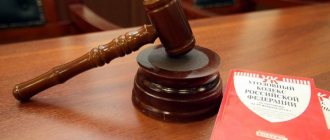Confrontation in criminal proceedings is a necessary investigative action.
It is carried out because the prosecution always needs the truth, the court must objectively consider the case, and differences must be eliminated. Thousands of people are prosecuted every year. Participation in any capacity is alarming. Participants are subject to the requirements of the law. Statistics from recent years show that half of the cases were considered in a special manner. Multi-channel free hotline Legal advice on criminal law. Every day from 9.00 to 21.00
Moscow and region: +7 (495) 662-44-36
St. Petersburg: +7 (812) 449-43-40
Difference from interrogation
Confrontation is a type of interrogation, but it has unique features. It is carried out only:
- In relation to previously interrogated persons.
- When their testimony differs on the same issue.
- With two faces at the same time.
Due to these features, confrontation is a psychologically more complex type of interrogation.
Purpose
A confrontation allows the investigator to obtain the most relevant and reliable information. At the same time , contradictions that appear when participants in the process give various testimonies are eliminated. It must be carried out if events or circumstances are described differently by witnesses, victims or suspects.
The investigator cannot transfer the case to the court until the optimal evidence base is formed. If there are contradictions in the testimony, then they cannot be used to form a base.
This is especially true if there is no direct evidence of a particular person’s guilt or it is impossible to determine the motives for the crime. Therefore, a confrontation is appointed, allowing several persons to be interrogated at once within the framework of one case.
Typically, contradictions arise for the following reasons:
- participants deliberately distort facts in order to remove suspicion from themselves;
- Witnesses are mistaken about their testimony because they incorrectly perceive information or various events.
Deliberate deception is often used to create a false alibi or avoid responsibility for committing a criminal act.
Different participants in the process are involved in the confrontation, which includes not only suspects and victims, but also witnesses. It is allowed to use various paired combinations, so the final decision is made by the investigator or prosecutor.
Any participant in the process, as well as their representatives or lawyers, can formulate a request for the procedure, for which a free application form is used.
Why is the confrontation done?
When a case is brought to court, the evidence must be clear.
But the interpretation of the same facts by the victim, witness and suspect differs. The confrontation serves to eliminate this contradiction.
The misrepresentation that needs to be corrected may occur intentionally or due to misconception (events were not remembered or described inaccurately).
Deliberate distortion aims to evade responsibility and create an alibi for oneself.
Confrontation participants:
- Suspect.
- Victim.
- Witness.
- Accused.
The investigator has the right to pair them up in a confrontation procedure at his personal discretion.
In addition to the investigator, the investigator and the prosecutor can decide to conduct it. The suspect, accused, victim and their representatives have the right to apply for this.
Services of our lawyers
- free legal advice on interrogations and confrontations;
- presence at interrogations and confrontations;
- carrying out on your behalf procedural actions related to violations during interrogations and confrontations.
It happens that a person goes for interrogations for weeks, and then suddenly one day he becomes a suspect, or even an accused. The investigator collected the necessary information little by little and then filed charges. An experienced lawyer would not allow this to happen. Feeling that the clouds were gathering, he would take action.
The investigator knows his rights and obligations, knows that he cannot violate the Code of Criminal Procedure. Then why are there so many violations during investigations? Why are people imprisoned without evidence? Because investigators were allowed to break laws. Because there was no one to defend the suspect and the accused, and he himself could not defend himself, because he had neither experience nor knowledge in jurisprudence.
Therefore, come for a consultation - it is completely free and does not oblige you to anything. Call or leave a message in the form below - we know how to protect you, but in order for us to help you, we need you to show up.
The procedure for conducting a confrontation
The procedure for this investigative measure is regulated by Articles 164 and 192 of the Code of Criminal Procedure of the Russian Federation.
Who conducts it?
The confrontation is carried out by an investigator, interrogating officer or prosecutor. He has the right to use the previously obtained testimony of the participants in the confrontation, but this must be recorded in the protocol. Since the goal is not to obtain new data on the case, but to eliminate inaccuracies, the investigator asks questions regarding this information.
Where is it held?
To conduct a confrontation, its participants are called to the department of the investigative agency, whose employee interrogates the participants in the case.
To do this, they are sent a summons, just like for a regular interrogation.
To know how to behave in a confrontation, it is necessary to understand the essence of investigative actions, the tasks and practice of Russian legal proceedings.
We read the indictment - “In an unspecified place, at an unspecified time, under unspecified circumstances, with unidentified accomplices, unidentified instruments of crime (etc.), Ivanov committed a crime against an indefinite number of persons.” The investigation considers as evidence the reports of employees, protocols of interrogations of employees, items seized from the accused (but not related to the case). Do you think this is fantastic? Not at all...
I described in detail the reasons why the investigation allows itself to send cases to court in this way in the article “how to behave during interrogation.” The evidence contained in the case materials is, as a rule, very formal - their main purpose is that the case should go to court without any problems and end with a verdict without any problems. Other investigative actions are carried out not even due to procedural necessity, but due to instructions and instructions from a higher organization or the prosecutor’s office. Such investigative actions (read evidence) include confrontations. And now I will allow myself, from the height of 16 years of legal experience, to explain to you how to behave in a confrontation...
I allowed myself such a lengthy digression to explain the essence of the confrontation and why it is actually needed. And it is needed to eliminate contradictions in the testimony of individuals. But as practice shows, confrontation never eliminates any contradictions. Persons meet in a confrontation, present their testimony, support their positions, and leave.
In principle, Article 192 of the Code of Criminal Procedure of the Russian Federation explains the procedure for conducting confrontations. But there are some points you need to remember.
First of all, as in the case of interrogation, carefully prepare for the confrontation. You should carefully analyze your testimony and work with your criminal defense attorney on the questions the investigator may ask you. It would be good if the investigator read out your testimony that you gave earlier. What if you have to repeat your own testimony again? There is a risk that there will be inconsistencies in your testimony. And this cannot be allowed. Contradictions in testimony mean a loss of confidence in you as a procedural person, and if your position does not coincide with the position of the prosecution, all contradictions will be reflected in the indictment and in court.
You must remember that the party opposite to you will most likely appear in a confrontation with a lawyer. A lawyer is not an investigator. You must be prepared for meticulous and numerous questions from him. You will be caught in contradictions. Perhaps they will put pressure on you, they will try to confuse and confuse you. You and your lawyer must not allow the other side to interrupt you or throw you off balance. Any insinuations against you must be recorded in writing in the protocol of the confrontation. If the pressure does not stop, it will be useful to apply (necessarily in writing) for audio and video recording of the confrontation.
Your psychological state is very important. Remember: the opposite side is no less nervous than you, and since the truth is yours, you must be calm and unperturbed in a confrontation.
In principle, a confrontation can be compared to a trial in miniature. You are sitting opposite a person who claims something different than you. And in order not to have a “pale look” at a confrontation, it is much more competent to carefully prepare long before it.
Conducting a confrontation is the right of the investigator. He may or may not conduct it. As I indicated earlier, the investigator, as a rule, conducts a confrontation, although its prospects are quite doubtful. At the same time, confrontations are often carried out even when one of the parties previously refused to testify. When refusing to testify, the parties naturally have no contradictions. However, the evidence in the case is usually of a formal nature. And the confrontation, which will not contain any additional information (persons either “stand” on their testimony or refuse to testify), will appear as evidence in the case.
Investigators and opposing counsel often ask leading or irrelevant questions. You have the right to declare the unlawful nature of the questions during the process of answering the corresponding question or indicate in writing at the end of the confrontation in the protocol of the confrontation.
You and your lawyer have the right to ask questions of the opposing party without a time limit. The investigator has the right to withdraw your question. As a rule, this is done if the question is inconvenient and goes against the accusation. However, the investigator is obliged to enter your question into the protocol of the confrontation.
If the confrontation was carried out with gross violations of the law, unprecedented pressure was put on you - do not hesitate: write a complaint to the head of the relevant department or to the supervising prosecutor's office. At the same time, it is important not to postpone the complaint for several days, but to submit it immediately. You also have the right to appeal the confrontation in court, in accordance with Art. 125 Code of Criminal Procedure of the Russian Federation. Most likely, your complaint will be denied, but filing it is carried out in the future. When considering the case on its merits, be sure to cover in detail the methods and means of obtaining evidence by the investigation through a confrontation.
Your problems are often frightening in their complexity and intricacy. You should not despair and need to call
+7
Our specialists will analyze your problem and develop ways to resolve it in accordance with your wishes, the real state of affairs, the practical experience of our employees and current legislation.
Good luck and success.
Order of conduct
During the interrogation, the investigator asks both participants to talk about the circumstances regarding which they previously gave conflicting testimony.
After their testimony, the investigator asks each participant in the confrontation additional questions. They also have the right to ask questions to each other, but only with the permission of the investigator.
All readings are recorded in strict sequence in the protocol. The investigator has the right to demonstrate physical evidence and ask questions about it, which is also included in the protocol.
Earlier testimony of interrogated persons can be read out only after a confrontation or refusal to undergo one.
The puncture is signed by both interrogated persons. Without their signatures it is considered invalid.
Requirements for an investigator during a confrontation
In order to conduct a confrontation, the investigator is obliged to:
Have a question for a lawyer? Ask now, call and get a free consultation from leading lawyers in your city. We will answer your questions quickly and try to help with your specific case.
Telephone in Moscow and the Moscow region: +7
Phone in St. Petersburg and Leningrad region: +7
Free hotline throughout Russia: 8 (800) 301-39-20
- Notify each participant.
- Explain the liability for giving false testimony.
- Ask questions clearly and unambiguously.
- Do not intimidate or use other methods of influence on those being interrogated.
- Present material evidence when the story of the interrogated requires it.
- Do not influence the course of the confrontation by playing along with one of its participants.
- Allow interrogation participants to ask questions of each other.
Compliance with these requirements allows you to obtain objective readings.
Tips for a lawyer
Any participant in legal proceedings may invite his or her lawyer during a confrontation. This will allow him to feel more confident during such a procedure. The role of the defense attorney will be to uphold the rule of law as much as possible in relation to his client. How should a lawyer behave in a confrontation?
Experienced defense attorneys can give some useful advice on this matter:
- First, you need to remember that the investigator in such a situation is not a friend to the lawyer. They have completely opposite goals. The investigator needs to find out as much as possible. The goal of the defense attorney is to provide the minimum amount of information necessary.
- During a confrontation, it is necessary to ensure that the client’s interests are not infringed. It is necessary to give him timely advice regarding the competence of certain issues.
- Carefully read all the documents that appear during the procedure. Perhaps there is a catch in some of these papers.
- Prevent any negative impact on the client. In an emergency, you can simply stop the conversation. At the same time, the lawyer himself must remain calm and restrain his emotions.
- Submit motions on behalf of your client that will help turn the situation in his favor.
The correct actions of a lawyer can provide the client with all possible assistance without prejudice to his interests.
How should the parties behave in a confrontation?
Depending on the status of the participant in the confrontation, he may have some difficulties.
Suspect
During a confrontation, the suspect is in the most vulnerable position, since the investigator can conclude that he is guilty. At the same time, a confrontation gives the suspect a chance to identify and prove the lie of a witness or victim, which he has the right to use to prove his innocence.
Recommendations for the behavior of the suspect:
- Answer questions confidently.
- Stand your ground if your opponent does not have compelling arguments to refute what the suspect has said.
- Admit only what cannot be denied.
- Play along with the investigator.
- Don't threaten or be aggressive.
- Involve a lawyer to participate in the interrogation (this is permitted by law).
- Request important aspects of the case (all motions are recorded in the minutes).
Since the status of a suspect does not yet indicate proof of guilt, a confrontation sometimes helps to identify facts that justify a given participant in the case.
Witness
Doubts in the testimony of witnesses may become the basis for an investigator's attempt to find out about the interest of a given person in a certain outcome of the case. This is how a witness sometimes turns into a suspect.
During a confrontation, a witness has the right to participate together with a lawyer. It is worth following your own testimony, not being aggressive and consistently proving your honesty and rightness.
Victim
Since the victim is interested in punishing the perpetrator, he should:
- Answer the investigator's questions frankly.
- Accurately convey information about the facts, without speculating or assuming anything.
- Calmly present your arguments without insulting the accused.
In some cases, the victim unknowingly distorts the facts because that is how he remembers them. The presence of a lawyer in such a situation will also not hurt.
Participation of a minor in an investigative action
Criminal cases involving minors are often difficult.
The behavior of minors depends on their mood and psychological readiness for challenges. Incomprehensible expressions and facial expressions cause an inadequate reaction. A change of mood will ruin the work done. Adults should carefully observe their behavior and formulate phrases and sentences correctly.
Lawyers know that teenagers trust friendly people. The investigation requires the minor to describe the situation. This will establish contact with an adult. You need to listen and give the child the opportunity to speak out. Then clarify the details.
When exposing an adult, it is especially necessary to establish contact with a teenager. It is better to carry out the work in a familiar place: at home, school. A familiar environment will help you relax. Interrogation of a teenager is possible only in the presence of an adult. Investigators invite teachers, parents, and relatives.
If a teenager has suffered in connection with a sexual crime, the presence of a loved one will interfere with the investigative measures. The investigator invites a completely unfamiliar teacher. If a minor provided false information, then it would be more appropriate to change the procedure. First, interview a bona fide participant whose testimony is not in doubt. Then it is more difficult for the teenager to defend his position.
Investigators are required to adhere to the following rules:
- A minor participates in the event only during the daytime.
- The investigative action lasts no more than 4 hours.
- After two hours there is a break.
- Ensure the participation of a psychologist or teacher during the interrogation of a teenager under 16 years of age.
- Invite a psychologist or teacher to an investigative action with a teenager over 16 years of age who is lagging behind in mental development or has a mental disorder.
Lawyers note an annual increase in the number of violations. Each violation must be recorded and appealed.
Possibility of refusing confrontation
Article 188.1 of the Code of Criminal Procedure of the Russian Federation states that it is impossible to refuse to participate in a confrontation. The summons for this type of interrogation indicates the consequences of refusal or failure to appear without a good reason. If the interrogated person fails to appear, he has the right to bring him in forcibly, on the basis of Article 111 of the Code of Criminal Procedure of the Russian Federation.
During a confrontation, the person being interrogated has the right to refuse to give evidence regarding himself and his loved ones if it could harm them. This right is described in Article 51 of the Constitution of the Russian Federation.









